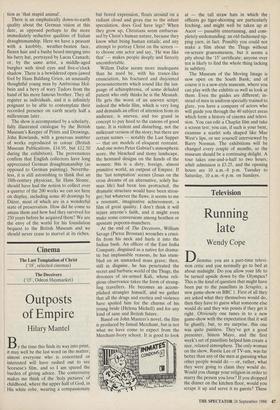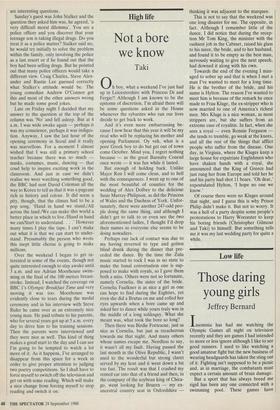Television
Running late
Wendy Cope
Dilemma: you are a part-time televi- sion critic and you normally go to bed at about midnight. Do you allow your life to be turned upside down by the Olympics? This is the kind of question that might have been put to the panellists in Scruples, a new game-show on BBC 1. First of all they are asked what they themselves would do, then they have to guess what someone else would do and they win points if they get it right. Obviously one tunes in to a new game-show with the expectation that it will be ghastly, but, to my surprise, this one was quite painless. They've got a good presenter, Simon Mayo, and the first week's set of panellists helped him create a nice, relaxed atmosphere. The only woman on the show, Rustie Lee of TV-am, was far better than any of the men at guessing what other people would do — or, rather, what they were going to claim they would do. Would you change your religion in order to marry the person you love? If you dropped the dinner on the kitchen floor, would you scrape it up and serve it to guests? These
are interesting questions.
Sunday's guest was John Stalker and the question they asked him was, he agreed, 'a very difficult moral dilemma'. You are a police officer and you discover that your teenage son is taking illegal drugs. Do you treat it as a police matter? Stalker said no, he would try initially to solve the problem within the family, only involving the police as a last resort or if he found out that the boy had been selling drugs. But he pointed out that many police officers would take a different view. Craig Charles, Steve Alex- ander and Rustie Lee guessed correctly what Stalker's attitude would be. The young comedian Andrew O'Connor got this and most of the other answers wrong but he made some good jokes.
Late on Friday night I decided that my answer to the question at the top of the column was 'No' and fell asleep. But at 4 a.m. I was wide awake again — perhaps it was my conscience, perhaps it was indiges- tion. Anyway, I saw the last hour of the opening ceremony in Seoul and it really was marvellous. For a moment I almost wished that I was still a primary school teacher because there was so much masks, costumes, music, dancing — that coud help to inspire exciting work in the classroom. And just in case we didn't realise we were watching something good, the BBC had sent David Coleman all the way to Korea to tell us that it was a pageant rich in history and colour. It did seem a pity, though, that the climax had to be a pop song. 'Hand in hand we stand,/All across the land./We can make this world a better place in which to live./Hand in hand we can/Start to understand. . . .' However many times I play the tape, I can't make out what it is that we can start to under- stand. Presumably the person who wrote this inept little chorus is going to make millions.
Over the weekend I began to get in- terested in some of the events, though not quite interested enough to stay awake until 3 a.m. and see Adrian Moorhouse swim- ming in the final of the 100 metres breast- stroke. Instead, I watched the coverage on BBC l's Olympic Breakfast Time and very moving it was too. Moorhouse was evidently close to tears during the medal ceremony and in his interview with Steve Rider he came over as an extremely nice young man. He paid tribute to his parents, who for several years got up at 5 a.m. every day to drive him to his training sessions. Then the parents were interviewed and they were nice as well. This kind of thing makes a good start to the day and I can see I'm going to be tempted to watch a lot more of it. As it happens, I've arranged to disappear from this space for a week in order to give proper attention to judging two poetry competitions. So I shall have to force myself to switch off the television and get on with some reading. Which will make a nice change from forcing myself to stop reading and switch it on.































































 Previous page
Previous page